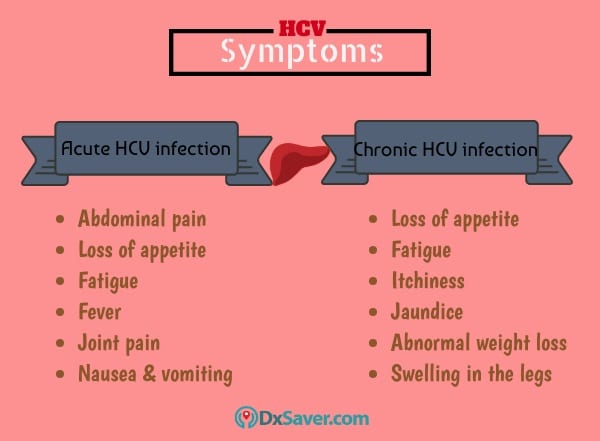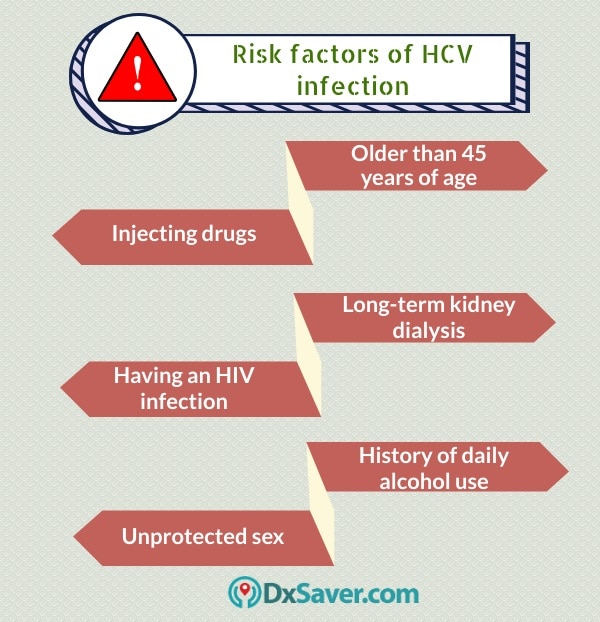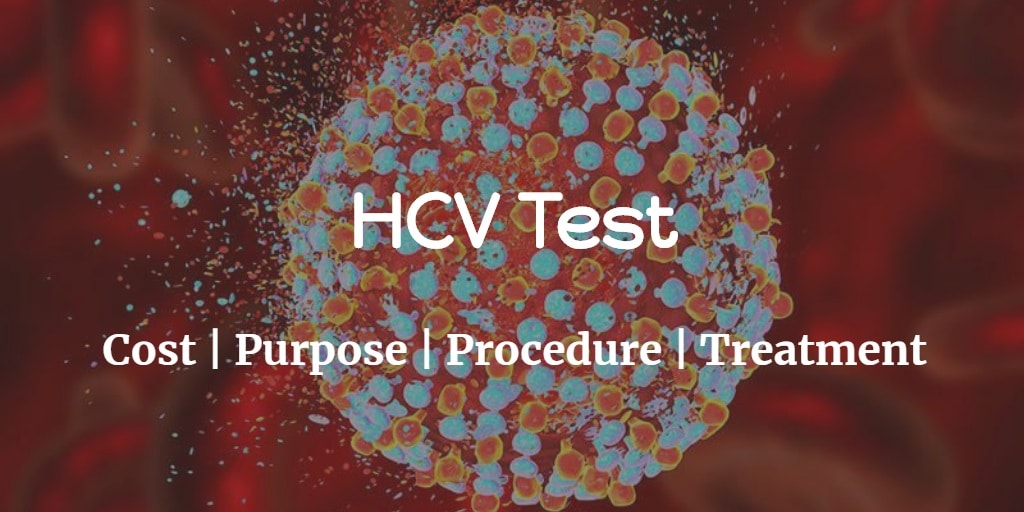
Hepatitis C virus infection is also commonly known as HCV or “Hep C” virus. According to the Centers for Disease Control and Prevention (CDC), nearly 2.4 million people in the U.S. are living with HCV (hepatitis C virus) infection. Hepatitis C infection can be easily transmitted and lead to severe complications if left undiagnosed and untreated at an early stage. So we highly recommend everyone who is at a higher risk of getting the infection or experiences the symptoms of hepatitis C infection to get tested for HCV test.
The article below covers all the relevant topics of hepatitis C-viral infection like “Hep C” test cost, what is an HCV, Hepatitis C symptoms, hepatitis C transmission, Hep C treatment, complications, and how to get tested for a Hepatitis C infection.
- Cost of HCV Test.
- What is an HCV test?
- What is a hepatitis C or “Hep C” virus?
- Hepatitis C transmission
- Types of hepatitis C infection.
- Hepatitis C symptoms.
- Who is recommended to get tested for an HCV test?
- How is the Hepatitis C blood test performed?
- Is there any preparation required before the test?
- Are there any risks in the test?
- What does the test result mean?
- Hepatitis C treatment.
- Complications of the Hep C infection.
- How to prevent Hepatitis C infection?
- Providers Locations.
For our readers who are more interested in knowing the Hep C test cost beforehand, we would like to begin with that section.
How much does the HCV test or Hepatitis C test cost?
Hepatitis C test cost ranges between $14 and $299 in different labs and facilities across the U.S. The cost of the HCV test also depends on the type of test i.e. HCV antibody test or HCV RNA test.
No prior appointment is required. Compare the price, order your test online and visit the nearest lab during lab business hours. Complete the procedure and get the results in your email in 2 to 3 business days. Doctor consultation is also available for further treatment or any kind of medical advice.
HCV antibody test cost
HCV antibody test is done to look for the antibodies that fight against the hepatitis C virus. The antibodies usually appear after 12 weeks of initial exposure to the virus. HCV antibody test cost ranges between $14 and $62 in different labs and facilities across the U.S.
The following table shows the HCV antibody test cost at 3 of our partner laboratories (CLIA – Certified) network located across the U.S.
Name of our Partner Labs | Book Online |
HealthLabs
| Offer Price$24 |
STD Check Labs
| Offer Price
|
Personal Testing Lab
| Offer Price$62 |
HCV RNA test cost
HCV RNA (real-time PCR) test is ordered only when the HCV antibody test results are positive. This test helps to find out whether the hepatitis C virus is still present in the body. HCV RNA test cost ranges between $221 and $299 in different labs and facilities across the U.S.
The following table shows the HCV RNA test cost at 2 of our partner laboratories (CLIA – Certified) network located across the U.S.
Name of our Partner Labs | Book Online |
HealthLabs
| Offer Price$239 |
Personal Testing Lab
| Offer Price$221 |
Hepatitis C test cost with insurance
Most of the health insurance policies in the U.S. do not cover the cost of the hepatitis C test. However, this also depends on your overall health condition and the coverage of your insurance plan.
Our HCV testing providers do not accept any kind of health insurance plan. But, they can provide you with an itemized receipt containing all the details like the test name and code, and CPT code which is necessary for insurance reimbursement purposes.
What is an HCV test?
HCV test or Hepatitis C test is a simple blood test done to look for and confirm the presence of the hepatitis C virus in the body. Testing for HCV infection is a two-step process.
1. HCV antibody test:
This is the initial screening test done to look for the antibodies that fight against the hepatitis C virus in the body. The test results may be either positive or negative.
2. HCV RNA quantitative test (real-time PCR):
This test is done as a follow up after initial positive hepatitis C screening to confirm the diagnosis. It also helps in the prognosis and treatment of the infection.
What is the Hepatitis C virus?
HCV refers to the hepatitis C virus, one of the five hepatitis viruses. This virus invades the liver cells and causes a contagious liver disease called hepatitis C. Hepatitis C infection is also commonly known as HCV or “Hep-C”.
Hepatitis C is a major and common blood-borne disease in the U.S. This infection slowly progresses in the stages starting from the liver inflammation to severe liver damage or cirrhosis (scarring of liver tissue). If the hepatitis C infection is not treated and cured in the initial stage, it becomes chronic and leads to scarring, liver cancer, and death in extreme cases.
How is HCV transmitted?
Hepatitis C virus is generally transmitted via blood or other body fluids of an infected person. It can be also passed on to others when a person comes into sexual contact with an HCV infected person. A pregnant woman with the infection has a high probability to transfer the disease to her child at birth. However, the Hepatitis C virus is not spread through casual contact, sharing food, utensils and lip balm, kissing, or mosquito bites.
Types of Hepatitis C infection
1. Acute HCV infection:
Acute HCV infection is hardly diagnosed because of the lack of symptoms experienced. People with acute HCV infection will start noticing the symptoms only after 4 to 15 weeks of initial exposure to HCV.
2. Chronic HCV infection:
HCV infection becomes chronic when the virus stays in the body for more than six months after the acute stage. This infection cannot be cured until treated with proper medications. If left untreated, it can lead to cirrhosis, liver failure, and liver cancer.
Symptoms of Hepatitis C infection
People with hepatitis C infection experience symptoms based on the type of HCV infection.
Symptoms of acute HCV infection
People with acute HCV infection are mostly asymptomatic. However, some develop symptoms that include
- Pain in the abdomen
- Loss of appetite
- Yellowish, dark urine
- Fatigue
- Fever
- Clay-colored stool
- Joint pain
- Nausea
- Vomiting
- Jaundice (in rare cases)
Symptoms of chronic HCV infection
- Fatigue
- Unexplained itchiness
- Jaundice
- Loss of appetite
- Swelling in the legs and abdomen
- Abnormal weight loss

Who is recommended to get tested for an HCV test?
People with the above-mentioned symptoms or people with the following risk factors are advised to get tested for an HCV test.
- Older than 45 years of age
- Currently injecting or using drugs
- Having an HIV infection
- Long-term kidney dialysis
- Had a blood transfusion before July 1922*
- Children born to HCV infected women
- Have been exposed to the blood of HCV infected person
- Hemophilia (a rare condition in which the blood doesn’t clot properly)
- Unprotected sex
- Liver disease
- History of daily alcohol use
*The blood supply has been monitored in the U.S. since July 1992 and any blood that tests positive for HCV infection is rejected.

How is the HCV test performed?
Test for Hepatitis C is a simple blood test done using the blood sample.
During this test, a lab technician or a phlebotomist will cleanse the area to be injected with an antiseptic and wrap an elastic band around the upper arm to make the vein visible and pool with blood. He/she then injects a needle to draw a sample of blood and collects the blood sample in a test tube. After the blood is drawn, he/she covers the injected area with a band-aid or a cotton ball to stop bleeding. The collected blood sample is then sent to the lab for further analysis.
It takes less than 5 to 10 minutes to perform this test.
The right time to test for Hepatitis C infection
Generally, Hepatitis C antibodies do not appear up to 12 weeks after the initial exposure of infection. To ensure accurate results, physicians recommend waiting for up to a certain period or getting retested after 3 to 6 months of initial testing.
Also, we highly recommend getting tested for HCV infection again after 6 months of the initial treatment to get rid of reinfection.
Is there any preparation required before the test?
No fasting or any other special preparation is required before taking the HCV test. If you have any abnormal bleeding disorder, inform the phlebotomist before taking the test.
Are there any risks in the test?
There are no possible risks or complications in taking the HCV test. But sometimes, after the blood sample is drawn, you might feel slight pain, dizziness, redness or bruise in the injected area for a very little period.
What does the test result mean?
If the HCV antibody test results are negative, it means that the person has not been exposed to the virus. However, if you suspect that you have been exposed to the virus, get tested for HCV antibody test again after a certain period. If the test results are positive, it means that the person has been exposed to the virus at some point in time.
Your physician will order an HCV RNA (real-time) PCR test if your HCV antibody test results are positive. This test will ensure whether the virus is still present in the body.
If the PCR test results are positive, it means that the virus is still present and a liver biopsy might be ordered to evaluate the severity of the disease and the extent of liver damage. The genotype of the virus will also be established by testing to determine the treatment, cure rate, and preferred medications.
Hepatitis C treatment
Your physician will decide the Hepatitis C treatment based on the severity of the disease. Early-stage of the hepatitis C infection can be treated with antiviral medications. If the liver is damaged extensively, liver transplantation may be an option.
Hepatitis C Vaccine
There has not been a vaccine developed for hepatitis C until late 2020, which has resulted in millions of death due to liver cirrhosis caused by the Hep C virus. On October 5th, 2020 – Three scientists, Harvey Alter, Charles Rice, and Michael Houghton was awarded Noble Price in Medicine for a breakthrough in Science contributing to the development of the Hepatitis C Vaccine.
What happens if HCV is left untreated?
If the Hepatitis C treatment is not taken in the earlier stages, it might lead to more complications like cirrhosis (scarring of the live tissue), liver failure, liver cancer, and death in the most extreme cases.
How to prevent Heptatits C infection?
The following are some of the excellent methods to prevent “Hep C” infection.
- Use condoms or dental dams during vaginal, anal, or oral sex if you have multiple sex partners.
- Don’t share needles or razor blades.
- Don’t get tattoos or piercings in an unregulated environment.
- Avoid alcohol as it makes the disease very difficult to treat.
- Quit smoking.
- Maintain a healthy, and balanced diet.
- Avoid direct contact with blood or blood products.
However, a vaccine has been developed to prevent and eradicate the hepatitis C Virus, like hepatitis A and hepatitis B.
Providers Locations
Hepatitis C testing can be done in any of the following locations across the U.S. by visiting the lab. To know the HCV test cost, refer to the first section of the article.
- Alabama
- Alaska
- Arizona
- Arkansas
- California
- Colorado
- Connecticut
- Delaware
- Florida
- Hawaii
- Georgia
- Idaho
- Illinois
- Indiana
- Iowa
- Kansas
- Kentucky
- Louisiana
- Maine
- Michigan
- Minnesota
- Mississippi
- Missouri
- Montana
- Nebraska
- Nevada
- New Hampshire
- New Mexico
- North Carolina
- North Dakota
- Oklahoma
- Oregon
- Pennsylvania
- Puerto Rico
- South Carolina
- South Dakota
- Tennessee
- Texas
- Utah
- Vermont
- Virginia
- Washington
- West Virginia
- Wisconsin
- Wyoming
Frequently Asked Questions
Will insurance cover my testing cost?
No, insurance will not be covered in the billing. However, they will provide you a receipt for insurance reimbursement purposes.
How should I book my appointment?
You can choose the most suitable provider from above and make an appointment by following the instructions mentioned by them.
Can I cancel my lab test order?
Yes, you can cancel your lab test order anytime before your testing. A refund will be initiated after deducting the cancellation fee. However, cancellation is at the discretion of the provider.
Do the providers offer result interpretations?
Yes, a few providers may provide doctor consultation who will take you through the results and provide clarification if needed.
How do I receive my report?
To ensure your privacy, the test report will be mailed to you by the provider.
Other topics you may be interested in:-
- Compare Planned Parenthood STD Testing Cost Vs. Other Health Providers
- STD Testing Cost in the U.S.
- Complete Blood Count (CBC) Test Cost in the U.S.
- How Much Does the C-Peptide Test Cost in the U.S?
- Cost of D-dimer Test Cost in the U.S
- What are STDs symptoms? – What STDs cause dry skin?
- Prolactin Test Cost in the U.S
- How Much Does Stool Culture Test Cost in the U.S?
- Lipase Test Cost in the U.S.
- What STDs cause Sore Throat?
- Cost of Urine Culture Test in the U.S.
- Why is Gonorrhea STD called “The Clap”?
- Types of STDs that cannot be cured
- Signs and Symptoms of Oral Syphilis
- Food Sensitivity Test Cost in the U.S.
- HPV in Women: Symptoms, Genital Warts, Treatment and More
- Oral STDs: Names, Symptoms, Treatment and Testing Cost
- Causes of Penile Rashes and Other STD Symptoms in Men






